Iranian Actress Taraneh Alidousti Released On Large Bail

Famous Iranian actress Taraneh Alidousti has finally been released from prison on a heavy bail amid international outcry for her freedom.

Famous Iranian actress Taraneh Alidousti has finally been released from prison on a heavy bail amid international outcry for her freedom.
The Iranian popular cinema star, who was detained three weeks ago after expressing support for nationwide protests, was freed from the notorious Evin prison in Tehran Wednesday on a bail of more than 30,000 dollars, or ten billion Iranian rials.
Photos published on social media show that she was welcomed by a group of cinema artists after the release.
Alidousti, who previously published a photo of herself without headscarf on social networks, was not wearing the mandatory hijab in these photos again.
This comes as on Wednesday Iran’s authoritarian Supreme Leader Ali Khamenei said in a meeting with a group of pro-regime women that "The hijab is undoubtedly a religious and inviolable necessity.”
Reports said that 20 days ago Taraneh Alidousti was transferred to ward 209 of Evin prison which is administered by the intelligence ministry.
The detention of Alidousti drew widespread international reactions, especially from the most prestigious film festivals in the world, such as Cannes, Berlinale, and Tribeca.
Over 600 artists around the world signed a petition urging the Islamic Republic to release the Iranian actress.
In the online campaign launched under the title "Justice for Taraneh Alidousti", dozens of the world's most prominent figures, including Mark Ruffalo, Pedro Almodovar, Penelope Cruz, Juliette Binoche, Alfonso Cuaron and Ken Loach joined the signatories.
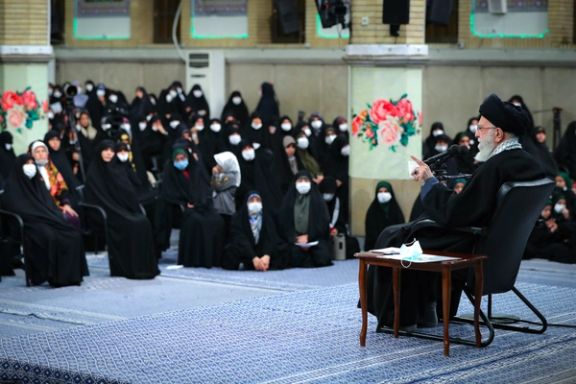
Islamic Republic’s Supreme Leader Ali Khamenei has reiterated the regime’s propaganda about the current wave of protests, failing to acknowledge women’s rebellion against hijab.
Addressing a group of cherrypicked women from his supporters on Wednesday, he rejected the facts that women are unveiling in public to defy the mandatory Islamic dress code – or hijab. It was forcible enforcement of hijab in society that triggered popular protests since September - the boldest challenge the Islamic Republic has ever faced.
“The absolute brazenness of the West comes into sight when it presents itself as the forerunner of advocacy for women’s rights, whilst it is responsible for flurries of blows dealt to the dignity and prestige of women. This could be explained as utter shamelessness... This is what they suggest by women’s rights and freedom. This is by no means freedom, but rather utter slavery,” Khamenei said.
Despite a massive number of videos and photos of women and schoolgirls unveiling and burning their headscarves in protest to the compulsory hijab as well as the clerical regime, Khamenei claimed that women did not remove their hijab during the protests.
Khamenei’s refusal to acknowledge 110 days of ongoing protests, ignited by the death of 22-year-old Mahsa Amini in the hands of hijab enforcement police, has led to an explosion of tweets and posts against him and the regime on social media Wednesday.
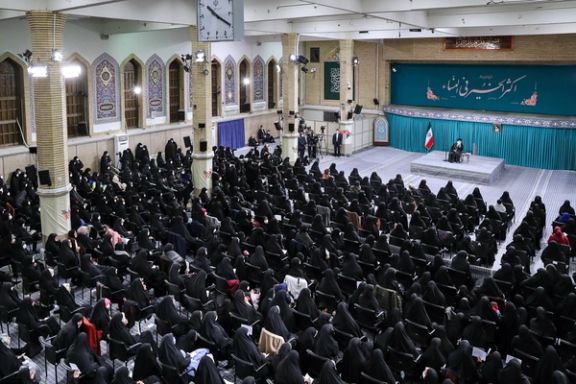
During the hour-long session, he almost exclusively talked about women and hijab but stopped short of stating his final opinion about how to enforce hijab in society, which could lead to more protests. Khamenei called hijab a religious must but added that those who do not wear “full hijab” should not be accused of irreligious. Describing hijab as the inevitable duty for all Muslim women, at the same time he emphasized that no Iranian woman should be labeled as non-religious or anti-revolutionary if she fails to fully honor the obligation.
He criticized the intermingling of men and women in Western societies, saying that contrary to the propagated notion, the coexistence has failed to diminish men’s carnal desires and has instead amplified it, resulting in women and girls being sexually harassed on streets, in workplaces, educational centers and even in military facilities. “Sex trade, sexual slavery, violation of all moral and humanitarian principles, and legalization of issues that are forbidden in all divine religions” are now widely prevalent across the West, Khamenei claimed. He failed to mention that all these problems exist also in Iran and “men’s carnal desires” are legalized in the Islamic Republic where they can legally have up to four wives and as many concubines as they desire.
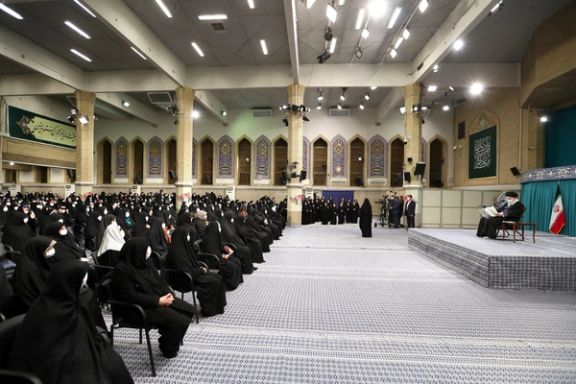
He also opted not to talk about the inequality of men and women in their basic rights. The Islamic Republic’s constitution clearly states that women are considered as inferior to men in terms of inheritance, testifying in courts and in many other areas according to the Islamic law or sharia. Women in Iran are not allowed to travel abroad without the permission of a male guardian, their share in inheritance is half of what male family members receive -- the financial compensation paid to survivors in cases of unnatural death, is also half of that of a man.
Khamenei tried to sound progressive by underlining the importance of employing efficient, experienced, knowledgeable, and wise women at various levels of Iran’s decision-making apparatus, but practically women hardly ever manage to be appointed for top jobs, let alone the jobs that are totally banned for women, such as becoming a judge. He pointed to motherhood and homemaking as the two main and primary roles of each and every woman.
In December, the Islamic Republic was voted out of the United Nations Commission on the Status of Women (CSW) for policies contrary to the rights of women and girls.
In its 2022 report on the Global Gender Gap Index, which was released in July, the World Economic Forum placed Iran at the rock bottom only after Afghanistan, Pakistan, and Congo.

Amid increasing pressure on imprisoned protestors, the wave of hunger strikes in Iranian prisons is on the rise with the detainees’ health in danger.
Mohammad Reza Azhar, an 18-year-old teenager, who was arrested in the religious city of Mashhad in the northeast on September 22, said in an audio message that the blood vessels of his eyes were torn due to severe mental pressure.
Meanwhile, Armita Abbasi, and over a dozen other prisoners in Kachouie prison of Karaj, west of Tehran, have gone on hunger strike since Monday to protest the lack of attention to their indefinite detention, lack of access to lawyers and the danger of harsh verdicts.
Jasmin Haj Mirza Mohammadi, a 25-year-old citizen, who was sentenced to five years in prison has also refused to eat anything since Monday.
Hamideh Zarei, suffering from anemia and low blood pressure, is also on strike while her move is extremely dangerous for her health.
Another prisoner close to her said Hamideh was severely beaten while being arrested, adding that her court was held on December 29 through video call as she was not allowed to choose a lawyer.
On the other hand, reports say Farshid Nowrozi, an English literature professor at Mazandaran University, has been expelled for supporting protesting students.
However, the authorities of the Islamic Republic are still denying the bloody suppression of the protests. On Tuesday, Masoud Satayshi, the judiciary spokesman, called numerous reports about sexual harassment and rape of imprisoned women "lies”, saying no documents have been presented in this regard so far.
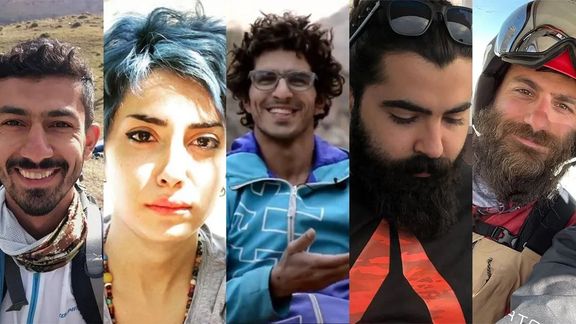
The Islamic Republic has framed several Iranian athletes saying they were planning a terrorist bombing in a case full of contradictory remarks by the officials.
Security organs have arrested at least five athletes – all hailing from the city of Shiraz – on charges of being involved in a "bombing" plot, which the agents of the Islamic Republic claim to have foiled.
The five were arrested in a period of about one month from late October to November 2022 in different cities. Iran International’s Maryam Moqaddam says at least 10 people were implicated in the case but only the names of five of them were released to the media. Snowboard instructors Dena Sheibani and Arsalan Mahdavi, climbing instructor Hesam Mousavi, former national team mountain biker Eshragh (Eshraq) Najafabadi, and mountaineer Mohammad Khiveh are the five detained on charges of planning the bombing.
As is the new normal for the detentions in Iran, the authorities also extracted confessions from them under duress. There are some unconfirmed reports that Sheibani and Khiveh were released on bail.
Their case had been full of conflicting statements since the beginning. Even the place of the alleged bombing is not yet known. On October 28, the authorities announced that they arrested someone carrying “a bag of explosives with strong destruction power” who wanted to plant a bomb in Shiraz’s Ma'aliabad neighborhood.
A deputy for political and security issues of Fars province’s governor earlier rejected reports of “the bombing” saying that no bomb was planted and explosives such as TNT were not involved. Someone with a package that contained “flammable liquids and some accessories" was arrested in the neighborhood, he claimed.
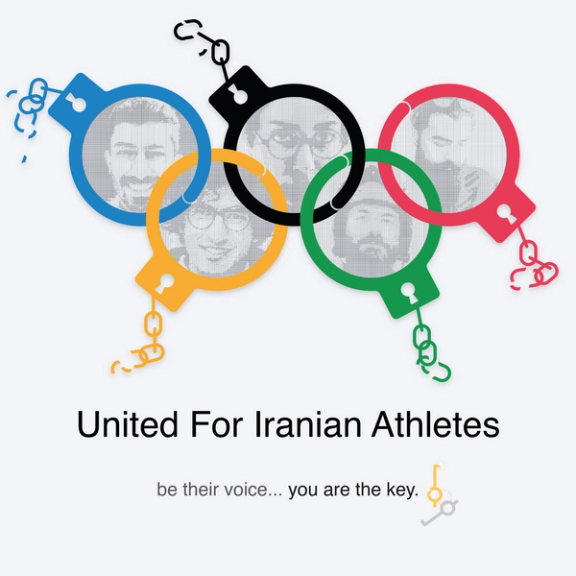
In a video of forced confessions, the climbing instructor Mousavi said that the bombing was planned to take place outside the governor’s office, which is more than a two-hour walk to the Ma'aliabad neighborhood. In the videos, Dena Shibani, the only woman accused in this case, was introduced as the "publicity officer responsible for advertising and testing operations" without providing further details about her role.
However, on December 1, some state media reported a different story of the alleged "bombing" saying that a “suspicious package” was “neutralized” by the bomb squad. In videos published by the state media, some officers seem to be removing small plastic bags of something supposed to be explosives from a small bucket.
The real reason for arresting so many sports people is not even clear, but the indications of extracting forces confessions and contradictory statements by officials clearly show an attempt to frame the detainees.
The arrests occurred only a few days after Iran’s intelligence ministry had announced the arrest of 26 people including foreigners on charges related to an attack on a Shia shrine October 26 that killed 15 people. The ministry said in a statement that these people were detained in different provinces as well as “at the eastern borders while fleeing the country.”
The ministry identified the assailant in Shahcheragh shrine as a Tajik citizen named Sobhan Komrooni with the nickname “Abu Aisha” and an Afghan person named Mohammed Ramez Rashidi as the “supporting element” of the operation. ISIS took responsibility for the attack on the Shahcheragh in Shiraz on October 26, but some questioned the Islamic Republic’s account saying it was staged by the regime itself to distract attention from nationwide protests.
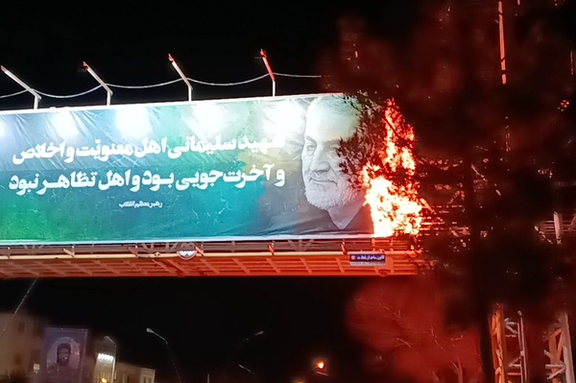
On the third death anniversary of ex-IRGC commander Qassem Soleimani’s death, people in different parts of Iran burned his statues and posters, including in his hometown.
Videos received by Iran International show people setting fire to Soleimani’s banners and posters in Tehran, Karaj, Zarinshahr, Rafsanjan, and his hometown Kerman.
The Islamic Republic through its propaganda tries to show Soleimani as a national hero, but many people believe he was guilty of war crimes against civilians in Syria and spreading violence in the region.
On January 3, 2020, the US military, on the order of President Donald Trump, killed Soleimani in a drone strike near Baghdad International Airport, saying that he had been "actively developing plans to attack American diplomats and service members in Iraq and throughout the region."
In a Monday statement, the Iranian regime claimed that Washington conducted the killing of Soleimani with "false claims and pretexts, including under the guise of counter-terrorism" and in "naked violation of the tenets and principles of international law."
Iranian Foreign Minister Hossein Amir-Abdollahian said on Sunday that nearly 60 US officials have been blacklisted by Tehran for their involvement in the assassination of Soleimani.
The US State Department told Iran International that Washington protects its citizens against possible retaliatory measures by the Islamic Republic.
At the same time, global efforts are underway to place the Revolutionary Guards in the list of terrorist organizations. The UK and Germany are set to announce the designation of the IRGC in the near future.
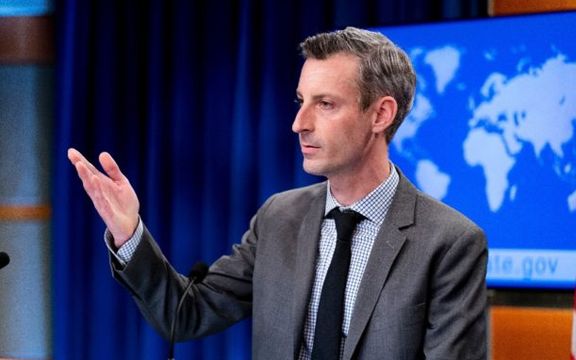
US State Department said Tuesday that nuclear talks with Iran remain dormant and although diplomacy is the preferred approach, other options remain on the table.
Spokesperson Ned Price said the United States has not observed any change from the Iranian side to warrant a resumption of negotiations to revive the 2015 nuclear accord known as the JCPOA. The Biden administration’s 18-month-long diplomatic effort to reach agreement with Tehran arrived at a deadlock in early September.
"We continue to believe that diplomacy is the best way to achieve that goal, but we’ve always been clear we’re not going to remove options from the table, and we’re going to discuss all options with our partners, including, of course, Israel," Price asserted.
Israeli leaders have repeatedly said that they will use any means for stopping Iran from obtaining nuclear weapons.
“The point we’ve made is that the Iranians killed the opportunity for a swift return to mutual compliance with the JCPOA,” he said referring to what the US in September called “extraneous” demands by Tehran.
He also repeated earlier assertions that the Biden administration’s focus is no longer on the nuclear talks, but on the twin issues of protests in Iran and Tehran’s supply of kamikaze drones to Russia, which have been used by hundreds to attack Ukraine’s civilian infrastructure.
“Since September especially, our focus has been on standing up…for the fundamental freedoms of the Iranian people and countering Iran’s deepening military partnership with Russia and its support for Russia’s war in Ukraine,” Price maintained.
Asked if the US has discussed the issue of stopping Iran from supplying UAVs to Russia with Israel, which in the past has been able to sabotage Iran’s nuclear plants, Price said: We have absolutely had discussions with our Israeli partners regarding the threat presented by Iranian UAV technology and the proliferation of Iranian UAV technology to countries around the world, including to Russia.
The Biden administration has been quick in starting discussion with the new Israeli right-wing government headed by Benjamin Netanyahu, a staunch opponent of the JCPOA. Secretary of State Antony Blinken held discussion with the new Israeli foreign minister Elie Cohen in recent days. He told new Israeli Foreign Minister Eli Cohen in a 40-minute phone-call that the JCPOA was finished, and that the US wanted the European Union to step up sanctions against Iran.
Blinken’s reported statement about JCPOA being “finished” echoed President Joe Biden’s remark during an election stomp in early November, when he was heard in a video saying the JCPOA “is dead.”
Biden's remark was welcomed by Israel's former government members who took credit for the failure of the talks. In a tweet on December 20, former prime minister Neftali Bennett said, “Great achievement by our government! Quietly, and through a series of diplomatic and other wise actions, we managed to stop the return to the nuclear deal without confronting the United States.”
Price was also asked during his Tuesday briefing if the administration will support a possible Iranian opposition coalition against the Islamic Republic.
He evaded a direct answer, saying, “first and foremost this is a question for the people of Iran, how or if they want to organize themselves.” But he went on to praise the anti-regime protest movement which “has been sparked and in many ways carried by the women and girls of Iran, but also the fact that it has been organic, it has crossed ethnic lines, it has crossed geographic lines inside of Iran, and it has in a sense been leaderless. That has allowed these protesters to continue and to persist with their efforts in ways that previous movements in Iran have not been able to.”
Price also reaffirmed US support for the movement. “It is our role and responsibility to support their freedom of expression, their freedom of assembly, every single other universal right and freedom that belongs to the Iranian people.”